https://github.com/boost-ext/ut
C++20 μ(micro)/Unit Testing framework
https://github.com/boost-ext/ut
bdd cpp20 tdd testing
Last synced: 5 months ago
JSON representation
C++20 μ(micro)/Unit Testing framework
- Host: GitHub
- URL: https://github.com/boost-ext/ut
- Owner: boost-ext
- License: bsl-1.0
- Created: 2019-10-06T01:33:26.000Z (over 6 years ago)
- Default Branch: master
- Last Pushed: 2025-07-07T23:22:35.000Z (8 months ago)
- Last Synced: 2025-07-08T01:33:33.696Z (8 months ago)
- Topics: bdd, cpp20, tdd, testing
- Language: C++
- Homepage: https://boost-ext.github.io/ut/
- Size: 5.31 MB
- Stars: 1,346
- Watchers: 25
- Forks: 134
- Open Issues: 93
-
Metadata Files:
- Readme: README.md
- Contributing: .github/CONTRIBUTING.md
- License: LICENSE.md
Awesome Lists containing this project
- awesome-hpp - ut - ext/ut?style=social)](https://github.com/boost-ext/ut/stargazers/) | UT: C++20 μ(micro)/Unit Testing Framework. | [](https://www.boost.org/LICENSE_1_0.txt) | (Testing Frameworks)
- awesome-modern-cpp - ut
README







> "If you liked it then you `"should have put a"_test` on it", Beyonce rule
# UT / μt
| [Motivation](#motivation) | [Quick Start](#quick-start) | [Overview](#overview) | [Tutorial](#tutorial) | [Examples](#examples) | [User Guide](#user-guide) | [FAQ](#faq) | [Benchmarks](#benchmarks) |
C++ single header/single module, macro-free μ(micro)/Unit Testing Framework
```cpp
#include // import boost.ut;
constexpr auto sum(auto... values) { return (values + ...); }
int main() {
using namespace boost::ut;
"sum"_test = [] {
expect(sum(0) == 0_i);
expect(sum(1, 2) == 3_i);
expect(sum(1, 2) > 0_i and 41_i == sum(40, 2));
};
}
```
```sh
Running "sum"...
sum.cpp:11:FAILED [(3 > 0 and 41 == 42)]
FAILED
===============================================================================
tests: 1 | 1 failed
asserts: 3 | 2 passed | 1 failed
```
> https://godbolt.org/z/f4jEcv9vo
Testing is a very important part of the Software Development, however, C++ doesn't provide any good testing facilities out of the box,
which often leads into a poor testing experience for develops and/or lack of tests/coverage in general.
> One should treat testing code as production code!
Additionally, well established testing practises such as [Test Driven Development (TDD)](https://en.wikipedia.org/wiki/Test-driven_development)/[Behaviour Driven Development (BDD)](https://en.wikipedia.org/wiki/Behavior-driven_development) are often not followed due to the same reasons.
The following snippet is a common example of testing with projects in C++.
```cpp
int main() {
// should sum numbers
{
assert(3 == sum(1, 2));
}
}
```
There are quite a few problems with the approach above
* No names for tests (Hard to follow intentions by further readers)
* No automatic registration of tests (No way to run specific tests)
* Hard to debug (Assertions don't provide any information why it failed)
* Hard to scale (No easy path forward for parameterized tests, multiple suites, parallel execution, etc...)
* Hard to integrate (No easy way to have a custom output such as XML for CI integration)
* Easy to make mistakes (With implicit casting, floating point comparison, pointer comparison for strings, etc...)
* Hard to follow good practises such as `TDD/BDD` (Lack of support for sections and declarative expressions)
* ...
`UT` is trying to address these issues by simplifying testing experience with a few simple steps:
* Just get a single [header](https://github.com/boost-ext/ut/blob/master/include/boost/ut.hpp) or [module+header](https://github.com/boost-ext/ut/blob/master/include/boost/ut.cppm)
* Integrate it into your project
* Learn a few simple concepts ([expect, test, suite](#api))
And you good to go!
Okay, great, but why I would use `UT` over other/similar testing frameworks already available in C++?
* [Boost.Test](https://github.com/boostorg/test)
* [GoogleTest](https://github.com/google/googletest)
* [Catch](https://github.com/catchorg/Catch2)
* [...](https://en.wikipedia.org/wiki/List_of_unit_testing_frameworks#C++)
Great question! There are a few unique features which makes `UT` worth trying
* Firstly, it supports all the basic Unit Testing Framework features (automatic registration of tests, assertions, suites, etc...)
* It's easy to integrate (it's just one [header/module](https://github.com/boost-ext/ut/blob/master/include/boost/ut.hpp))
* It's macro free which makes testing experience that much nicer (it uses modern C++ features instead, macros are opt-in rather than being compulsory - [Can I still use macros?](#macros))
* It's flexible (all parts of the framework such as: [runner, reporter, printer](#examples) can be customized, basically most other Unit Testing Frameworks can be implemented on top of UT primitives)
* It has smaller learning curve (just a few simple concepts ([expect, test, suite](#api)))
* It leverages C++ features to support more complex testing ([parameterized](#examples))
* It's faster to compile and execute than similar frameworks which makes it suitable for bigger projects without additional hassle ([Benchmarks](#benchmarks))
* It supports [TDD/BDD](#examples) workflows
* It supports [Gherkin](#examples) specification
* It supports [Spec](#examples)
* ...
Sounds intriguing/interesting? Learn more at
* [Tutorial](#tutorial)
* [Examples](#examples)
* [User-Guide](#user-guide)
> https://bit.ly/ut-quick-start (slides)
* No dependencies ([C++20](#cpp-20), Tested Compilers: GCC-9+, Clang-9.0+, Apple Clang-11.0.0+, MSVC-2019+*, Clang-cl-9.0+
* Single header/module ([boost/ut.hpp](https://github.com/boost-ext/ut/blob/master/include/boost/ut.hpp))
* Macro-free ([How does it work?](#how-it-works))
* Easy to use ([Minimal API](#api) - `test, suite, operators, literals, [expect]`)
* Fast to compile/execute ([Benchmarks](#benchmarks))
* Features ([Assertions](https://github.com/boost-ext/ut/blob/master/example/expect.cpp), [Suites](https://github.com/boost-ext/ut/blob/master/example/suite.cpp), [Tests](https://github.com/boost-ext/ut/blob/master/example/test.cpp), [Sections](https://github.com/boost-ext/ut/blob/master/example/section.cpp), [Parameterized](https://github.com/boost-ext/ut/blob/master/example/parameterized.cpp), [BDD](https://github.com/boost-ext/ut/blob/master/example/BDD.cpp), [Gherkin](https://github.com/boost-ext/ut/blob/master/example/gherkin.cpp), [Spec](https://github.com/boost-ext/ut/blob/master/example/spec.cpp), [Matchers](https://github.com/boost-ext/ut/blob/master/example/matcher.cpp), [Logging](https://github.com/boost-ext/ut/blob/master/example/log.cpp), [Runners](https://github.com/boost-ext/ut/blob/master/example/cfg/runner.cpp), [Reporters](https://github.com/boost-ext/ut/blob/master/example/cfg/reporter.cpp), [...](https://github.com/boost-ext/ut/blob/master/example))
* Integrations ([ApprovalTests.cpp](https://github.com/approvals/ApprovalTests.cpp/releases/tag/v.7.0.0))
Step 0: Get it...
> Get the latest latest header/module from [here!](https://github.com/boost-ext/ut/blob/master/include/boost/ut.hpp)
> Include/Import
```cpp
// #include // single header
// import boost.ut; // single module (C++20)
int main() { }
```
> Compile & Run
```
$CXX main.cpp && ./a.out
```
```
All tests passed (0 assert in 0 test)
```
> [Optional] Install it
```
cmake -Bbuild -H.
cd build && make # run tests
cd build && make install # install
```
> [Optional] CMake integration
This project provides a CMake config and target.
Just load `ut` with `find_package` to import the `Boost::ut` target.
Linking against this target will add the necessary include directory for the single header file.
This is demonstrated in the following example.
```cmake
find_package(ut REQUIRED)
add_library(my_test my_test.cpp)
target_link_libraries(my_test PRIVATE Boost::ut)
```
> [Optional] [Conan](https://conan.io) integration
The [boost-ext-ut](https://conan.io/center/boost-ext-ut) package is available from [Conan Center](https://conan.io/center/).
Just include it in your project's Conanfile with `boost-ext-ut/2.3.1`.
Step 1: Expect it...
> Let's write our first assertion, shall we?
```cpp
int main() {
boost::ut::expect(true);
}
```
```
All tests passed (1 asserts in 0 test)
```
> https://godbolt.org/z/vfx-eB
> Okay, let's make it fail now?
```cpp
int main() {
boost::ut::expect(1 == 2);
}
```
```
main.cpp:4:FAILED [false]
===============================================================================
tests: 0 | 0 failed
asserts: 1 | 0 passed | 1 failed
```
> https://godbolt.org/z/7qTePx
> Notice that expression `1 == 2` hasn't been printed. Instead we got `false`?
> Let's print it then?
```cpp
int main() {
using namespace boost::ut;
expect(1_i == 2);
}
```
```
main.cpp:4:FAILED [1 == 2]
===============================================================================
tests: 0 | 0 failed
asserts: 1 | 0 passed | 1 failed
```
> https://godbolt.org/z/7MXVzu
> Okay, now we have it! `1 == 2` has been printed as expected.
> Notice the User Defined Literal (UDL) `1_i` was used.
> `_i` is a compile-time constant integer value
* It allows to override comparison operators 👍
* It disallow comparison of different types 👍
See the [User-guide](#user-guide) for more details.
> Alternatively, a `terse` notation (no expect required) can be used.
```cpp
int main() {
using namespace boost::ut::literals;
using namespace boost::ut::operators::terse;
1_i == 2; // terse notation
}
```
```
main.cpp:7:FAILED [1 == 2]
===============================================================================
tests: 0 | 0 failed
asserts: 1 | 0 passed | 1 failed
```
> https://godbolt.org/z/s77GSm
> Other expression syntaxes are also available.
```cpp
expect(1_i == 2); // UDL syntax
expect(1 == 2_i); // UDL syntax
expect(that % 1 == 2); // Matcher syntax
expect(eq(1, 2)); // eq/neq/gt/ge/lt/le
```
```
main.cpp:6:FAILED [1 == 2]
main.cpp:7:FAILED [1 == 2]
main.cpp:8:FAILED [1 == 2]
main.cpp:9:FAILED [1 == 2]
===============================================================================
tests: 0 | 0 failed
asserts: 4 | 0 passed | 4 failed
```
> https://godbolt.org/z/QbgGtc
> Okay, but what about the case if my assertion is fatal.
> Meaning that the program will crash unless the processing will be terminated.
> Nothing easier, let's just add `fatal` call to make the test fail immediately.
```cpp
expect(fatal(1 == 2_i)); // fatal assertion
expect(1_i == 2); // not executed
```
```
main.cpp:6:FAILED [1 == 2]
===============================================================================
tests: 1 | 1 failed
asserts: 2 | 0 passed | 2 failed
```
> https://godbolt.org/z/WMe8Y1
> But my expression is more complex than just simple comparisons.
> Not a problem, logic operators are also supported in the `expect` 👍.
```cpp
expect(42l == 42_l and 1 == 2_i); // compound expression
```
```
main.cpp:5:FAILED [(42 == 42 and 1 == 2)]
===============================================================================
tests: 0 | 0 failed
asserts: 1 | 0 passed | 1 failed
```
> https://godbolt.org/z/aEhX4t
> Can I add a custom message though?
> Sure, `expect` calls are streamable!
```cpp
int main() {
expect(42l == 42_l and 1 == 2_i) << "additional info";
}
```
```
main.cpp:5:FAILED [(42 == 42 and 1 == 2)] additional info
===============================================================================
tests: 0 | 0 failed
asserts: 1 | 0 passed | 1 failed
```
> That's nice, can I use custom messages and fatal assertions?
> Yes, stream the `fatal`!
```cpp
expect(fatal(1 == 2_i)) << "fatal assertion";
expect(1_i == 2);
```
```
FAILED
in: main.cpp:6 - test condition: [1 == 2]
fatal assertion
===============================================================================
tests: 0 | 2 failed
asserts: 0 | 0 passed | 2 failed
```
> I use `std::expected`, can I stream its `error()` upon failure?
> Yes, since `std::expected`'s `error()` can only be called when there is no
> value it requires lazy evaluation.
```cpp
"lazy log"_test = [] {
std::expected e = std::unexpected("lazy evaluated");
expect(e.has_value()) << [&] { return e.error(); } << fatal;
expect(e.value() == true);
};
```
```
Running test "lazy log"... FAILED
in: main.cpp:12 - test condition: [false]
lazy evaluated
===============================================================================
tests: 1 | 2 failed
asserts: 0 | 0 passed | 2 failed
```
> https://godbolt.org/z/v2PDuU
Step 2: Group it...
> Assertions are great, but how to combine them into more cohesive units?
> `Test cases` are the way to go! They allow to group expectations for the same functionality into coherent units.
```cpp
"hello world"_test = [] { };
```
> Alternatively `test("hello world") = [] {}` can be used.
```
All tests passed (0 asserts in 1 tests)
```
> https://godbolt.org/z/Bh-EmY
> Notice `1 tests` but `0 asserts`.
> Let's make our first end-2-end test case, shall we?
```cpp
int main() {
"hello world"_test = [] {
int i = 43;
expect(42_i == i);
};
}
```
```
Running "hello world"...
main.cpp:8:FAILED [42 == 43]
FAILED
===============================================================================
tests: 1 | 1 failed
asserts: 1 | 0 passed | 1 failed
```
> https://godbolt.org/z/Y43mXz
> 👍 We are done here!
> I'd like to nest my tests, though and share setup/tear-down.
> With lambdas used to represents `tests/sections` we can easily achieve that.
> Let's just take a look at the following example.
```cpp
int main() {
"[vector]"_test = [] {
std::vector v(5);
expect(fatal(5_ul == std::size(v)));
should("resize bigger") = [v] { // or "resize bigger"_test
mut(v).resize(10);
expect(10_ul == std::size(v));
};
expect(fatal(5_ul == std::size(v)));
should("resize smaller") = [=]() mutable { // or "resize smaller"_test
v.resize(0);
expect(0_ul == std::size(v));
};
}
}
```
```
All tests passed (4 asserts in 1 tests)
```
> https://godbolt.org/z/XWAdYt
> Nice! That was easy, but I'm a believer into Behaviour Driven Development (`BDD`).
> Is there a support for that?
> Yes! Same example as above just with the `BDD` syntax.
```cpp
int main() {
"vector"_test = [] {
given("I have a vector") = [] {
std::vector v(5);
expect(fatal(5_ul == std::size(v)));
when("I resize bigger") = [=] {
mut(v).resize(10);
then("The size should increase") = [=] {
expect(10_ul == std::size(v));
};
};
};
};
}
```
```
All tests passed (2 asserts in 1 tests)
```
> https://godbolt.org/z/dnvxsE
> On top of that, `feature/scenario` aliases can be leveraged.
```cpp
int main() {
feature("vector") = [] {
scenario("size") = [] {
given("I have a vector") = [] {
std::vector v(5);
expect(fatal(5_ul == std::size(v)));
when("I resize bigger") = [=] {
mut(v).resize(10);
then("The size should increase") = [=] {
expect(10_ul == std::size(v));
};
};
};
};
};
}
```
```
All tests passed (2 asserts in 1 tests)
```
> https://godbolt.org/z/T4cWss
> Can I use `Gherkin`?
> Yeah, let's rewrite the example using `Gherkin` specification
```cpp
int main() {
bdd::gherkin::steps steps = [](auto& steps) {
steps.feature("Vector") = [&] {
steps.scenario("*") = [&] {
steps.given("I have a vector") = [&] {
std::vector v(5);
expect(fatal(5_ul == std::size(v)));
steps.when("I resize bigger") = [&] {
v.resize(10);
};
steps.then("The size should increase") = [&] {
expect(10_ul == std::size(v));
};
};
};
};
};
"Vector"_test = steps |
R"(
Feature: Vector
Scenario: Resize
Given I have a vector
When I resize bigger
Then The size should increase
)";
}
```
```
All tests passed (2 asserts in 1 tests)
```
> https://godbolt.org/z/jb1d8P
> Nice, is `Spec` notation supported as well?
```cpp
int main() {
describe("vector") = [] {
std::vector v(5);
expect(fatal(5_ul == std::size(v)));
it("should resize bigger") = [v] {
mut(v).resize(10);
expect(10_ul == std::size(v));
};
};
}
```
```
All tests passed (2 asserts in 1 tests)
```
> https://godbolt.org/z/6jKKzT
> That's great, but how can call the same tests with different arguments/types to be DRY (Don't Repeat Yourself)?
> Parameterized tests to the rescue!
```cpp
int main() {
for (auto i : std::vector{1, 2, 3}) {
test("parameterized " + std::to_string(i)) = [i] { // 3 tests
expect(that % i > 0); // 3 asserts
};
}
}
```
```
All tests passed (3 asserts in 3 tests)
```
> https://godbolt.org/z/Utnd6X
> That's it 😮!
> Alternatively, a convenient test syntax is also provided 👍
```cpp
int main() {
"args"_test = [](const auto& arg) {
expect(arg > 0_i) << "all values greater than 0";
} | std::vector{1, 2, 3};
}
```
```
All tests passed (3 asserts in 3 tests)
```
> https://godbolt.org/z/6FHtpq
> Check [Examples](#examples) for further reading.
Step 3: Scale it...
> Okay, but my project is more complex than that. How can I scale?
> `Test suites` will make that possible. By using `suite` in translation units
> `tests` defined inside will be automatically registered 👍
```cpp
suite errors = [] { // or suite<"nameofsuite">
"exception"_test = [] {
expect(throws([] { throw 0; })) << "throws any exception";
};
"failure"_test = [] {
expect(aborts([] { assert(false); }));
};
};
int main() { }
```
```
All tests passed (2 asserts in 2 tests)
```
> https://godbolt.org/z/_ccGwZ
---
> What's next?
> * [Examples](#examples)
> * [User-Guide](#user-guide)
Assertions
```cpp
// operators
expect(0_i == sum());
expect(2_i != sum(1, 2));
expect(sum(1) >= 0_i);
expect(sum(1) <= 1_i);
```
```cpp
// message
expect(3_i == sum(1, 2)) << "wrong sum";
```
```cpp
// expressions
expect(0_i == sum() and 42_i == sum(40, 2));
expect(0_i == sum() or 1_i == sum()) << "compound";
```
```cpp
// matchers
expect(that % 0 == sum());
expect(that % 42 == sum(40, 2) and that % (1 + 2) == sum(1, 2));
expect(that % 1 != 2 or 2_i > 3);
```
```cpp
// eq/neq/gt/ge/lt/le
expect(eq(42, sum(40, 2)));
expect(neq(1, 2));
expect(eq(sum(1), 1) and neq(sum(1, 2), 2));
expect(eq(1, 1) and that % 1 == 1 and 1_i == 1);
```
```cpp
// floating points
expect(42.1_d == 42.101) << "epsilon=0.1";
expect(42.10_d == 42.101) << "epsilon=0.01";
expect(42.10000001 == 42.1_d) << "epsilon=0.1";
```
```cpp
// constant
constexpr auto compile_time_v = 42;
auto run_time_v = 99;
expect(constant<42_i == compile_time_v> and run_time_v == 99_i);
```
```cpp
// failure
expect(1_i == 2) << "should fail";
expect(sum() == 1_i or 2_i == sum()) << "sum?";
```
```
assertions.cpp:53:FAILED [1 == 2] should fail
assertions.cpp:54:FAILED [(0 == 1 or 2 == 0)] sum?
===============================================================================
tests: 0 | 0 failed
asserts: 20 | 18 passed | 2 failed
```
> https://godbolt.org/z/E1c7G5
Tests
Run/Skip/Tag
```cpp
"run UDL"_test = [] {
expect(42_i == 42);
};
skip / "don't run UDL"_test = [] {
expect(42_i == 43) << "should not fire!";
};
```
```
All tests passed (1 asserts in 1 tests)
1 tests skipped
```
```cpp
test("run function") = [] {
expect(42_i == 42);
};
skip / test("don't run function") = [] {
expect(42_i == 43) << "should not fire!";
};
```
```
All tests passed (1 asserts in 1 tests)
1 tests skipped
```
```cpp
tag("nightly") / tag("slow") /
"performance"_test= [] {
expect(42_i == 42);
};
tag("slow") /
"run slowly"_test= [] {
expect(42_i == 43) << "should not fire!";
};
```
```
cfg = {.tag = {"nightly"}};
```
```
All tests passed (1 asserts in 1 tests)
1 tests skipped
```
> https://godbolt.org/z/X3_kG4
Sections
```cpp
"[vector]"_test = [] {
std::vector v(5);
expect(fatal(5_ul == std::size(v)));
should("resize bigger") = [=] { // or "resize bigger"_test
mut(v).resize(10);
expect(10_ul == std::size(v));
};
expect(fatal(5_ul == std::size(v)));
should("resize smaller") = [=]() mutable { // or "resize smaller"_test
v.resize(0);
expect(0_ul == std::size(v));
};
};
```
```
All tests passed (4 asserts in 1 tests)
```
> https://godbolt.org/z/cE91bj
Behavior Driven Development (BDD)
```cpp
"Scenario"_test = [] {
given("I have...") = [] {
when("I run...") = [] {
then("I expect...") = [] { expect(1_i == 1); };
then("I expect...") = [] { expect(1 == 1_i); };
};
};
};
```
```
All tests passed (2 asserts in 1 tests)
```
> https://godbolt.org/z/mNBySr
Gherkin
```cpp
int main() {
bdd::gherkin::steps steps = [](auto& steps) {
steps.feature("*") = [&] {
steps.scenario("*") = [&] {
steps.given("I have a number {value}") = [&](int value) {
auto number = value;
steps.when("I add {value} to it") = [&](int value) {
number += value;
};
steps.then("I expect number to be {value}") = [&](int value) {
expect(that % number == value);
};
};
};
};
};
"Gherkin"_test = steps |
R"(
Feature: Number
Scenario: Addition
Given I have a number 40
When I add 2 to it
Then I expect number to be 42
)";
}
```
```
All tests passed (1 asserts in 1 tests)
```
> https://godbolt.org/z/BP3hyt
Spec
```cpp
int main() {
describe("equality") = [] {
it("should be equal") = [] { expect(0_i == 0); };
it("should not be equal") = [] { expect(1_i != 0); };
};
}
```
```
All tests passed (2 asserts in 1 tests)
```
> https://godbolt.org/z/BXYJ3a
Parameterized
```cpp
for (auto i : std::vector{1, 2, 3}) {
test("parameterized " + std::to_string(i)) = [i] {
expect(that % i > 0);
};
}
"args"_test =
[](auto arg) {
expect(arg >= 1_i);
}
| std::vector{1, 2, 3};
"types"_test =
[] {
expect(std::is_integral_v) << "all types are integrals";
}
| std::tuple{};
"args and types"_test =
[](TArg arg) {
expect(fatal(std::is_integral_v));
expect(42_i == arg or "is true"_b == arg);
expect(type == type or type == type);
}
| std::tuple{true, 42};
```
When using the `operator|` syntax instead of a `for` loop, the test name will automatically
be extended to avoid duplicate names. For example, the test name for the `args and types` test
will be `args and types (true, bool)` for the first parameter and `args and types (42, int)`
for the second parameter. For simple built-in types (integral types and floating point numbers),
the test name will contain the parameter values. For other types, the parameters will simply be
enumerated. For example, if we would extend the test above to use
`std::tuple{true, 42, std::complex{0.5, 1}}`, the test name in the third run would be
`args and types (3rd parameter, std::complex)`. If you want to have the actual value of
a non-integral type included in the test name, you can overload the `format_test_parameter` function.
See the [example on parameterized tests](https://github.com/boost-ext/ut/blob/master/example/parameterized.cpp)
for details.
```
All tests passed (14 asserts in 10 tests)
```
> https://godbolt.org/z/4xGGdo
> And whenever I need to know the specific type for which the test failed,
> I can use `reflection::type_name()`, like this:
```cpp
"types with type name"_test =
[]() {
expect(std::is_unsigned_v) << reflection::type_name() << "is unsigned";
}
| std::tuple{};
```
```
Running "types with type name"...PASSED
Running "types with type name"...
:10:FAILED [false] float is unsigned
FAILED
```
> https://godbolt.org/z/MEnGnbTY4
Suites
```cpp
namespace ut = boost::ut;
ut::suite errors = [] {
using namespace ut;
"throws"_test = [] {
expect(throws([] { throw 0; }));
};
"doesn't throw"_test = [] {
expect(nothrow([]{}));
};
};
int main() { }
```
```
All tests passed (2 asserts in 2 tests)
```
> https://godbolt.org/z/CFbTP9
Misc
Logging using streams
```cpp
"logging"_test = [] {
log << "pre";
expect(42_i == 43) << "message on failure";
log << "post";
};
```
```
Running "logging"...
pre
logging.cpp:8:FAILED [42 == 43] message on failure
post
FAILED
===============================================================================
tests: 1 | 1 failed
asserts: 1 | 0 passed | 1 failed
```
> https://godbolt.org/z/26fPSY
Logging using formatting
This requires using C++20 with a standard library with std::format support.
```cpp
"logging"_test = [] {
log("\npre {} == {}\n", 42, 43);
expect(42_i == 43) << "message on failure";
log("\npost {} == {} -> {}\n", 42, 43, 42 == 43);
};
```
```
Running "logging"...
pre 42 == 43
logging.cpp:8:FAILED [42 == 43] message on failure
post 42 == 43 -> false
FAILED
===============================================================================
tests: 1 | 1 failed
asserts: 1 | 0 passed | 1 failed
```
> https://godbolt.org/z/26fPSY
Matchers
```cpp
"matchers"_test = [] {
constexpr auto is_between = [](auto lhs, auto rhs) {
return [=](auto value) {
return that % value >= lhs and that % value <= rhs;
};
};
expect(is_between(1, 100)(42));
expect(not is_between(1, 100)(0));
};
```
```
All tests passed (2 asserts in 1 tests)
```
> https://godbolt.org/z/4qwrCi
Exceptions/Aborts
```cpp
"exceptions/aborts"_test = [] {
expect(throws([] { throw std::runtime_error{""}; }))
<< "throws runtime_error";
expect(throws([] { throw 0; })) << "throws any exception";
expect(nothrow([]{})) << "doesn't throw";
expect(aborts([] { assert(false); }));
};
```
```
All tests passed (4 asserts in 1 tests)
```
> https://godbolt.org/z/A2EehK
Config
Runner
```cpp
namespace ut = boost::ut;
namespace cfg {
class runner {
public:
template auto on(ut::events::test test) { test(); }
template auto on(ut::events::skip) {}
template
auto on(ut::events::assertion) -> bool { return true; }
auto on(ut::events::fatal_assertion) {}
template auto on(ut::events::log) {}
};
} // namespace cfg
template<> auto ut::cfg = cfg::runner{};
```
> https://godbolt.org/z/jdg687
Reporter
```cpp
namespace ut = boost::ut;
namespace cfg {
class reporter {
public:
auto on(ut::events::test_begin) -> void {}
auto on(ut::events::test_run) -> void {}
auto on(ut::events::test_skip) -> void {}
auto on(ut::events::test_end) -> void {}
template auto on(ut::events::log) -> void {}
template
auto on(ut::events::assertion_pass) -> void {}
template
auto on(ut::events::assertion_fail) -> void {}
auto on(ut::events::fatal_assertion) -> void {}
auto on(ut::events::exception) -> void {}
auto on(ut::events::summary) -> void {}
};
} // namespace cfg
template <>
auto ut::cfg = ut::runner{};
```
> https://godbolt.org/z/gsAPKg
Printer
```cpp
namespace ut = boost::ut;
namespace cfg {
struct printer : ut::printer {
template
auto& operator<<(T&& t) {
std::cerr << std::forward(t);
return *this;
}
};
} // namespace cfg
template <>
auto ut::cfg = ut::runner>{};
int main() {
using namespace ut;
"printer"_test = [] {};
}
```
> https://godbolt.org/z/XCscF9
API
```cpp
export module boost.ut; /// __cpp_modules
namespace boost::inline ext::ut::inline v2_3_1 {
/**
* Represents test suite object
*/
struct suite final {
/**
* Creates and executes test suite
* @example suite _ = [] {};
* @param suite test suite function
*/
constexpr explicit(false) suite(auto suite);
};
/**
* Creates a test
* @example "name"_test = [] {};
* @return test object to be executed
*/
constexpr auto operator""_test;
/**
* Creates a test
* @example test("name") = [] {};
* @return test object to be executed
*/
constexpr auto test = [](const auto name);
/**
* Creates a test
* @example should("name") = [] {};
* @return test object to be executed
*/
constexpr auto should = [](const auto name);
/**
* Behaviour Driven Development (BDD) helper functions
* @param name step name
* @return test object to be executed
*/
constexpr auto given = [](const auto name);
constexpr auto when = [](const auto name);
constexpr auto then = [](const auto name);
/**
* Evaluates an expression
* @example expect(42 == 42_i and 1 != 2_i);
* @param expr expression to be evaluated
* @param source location https://en.cppreference.com/w/cpp/utility/source_location
* @return stream
*/
constexpr OStream& expect(
Expression expr,
const std::source_location& location = std::source_location::current()
);
struct {
/**
* @example (that % 42 == 42);
* @param expr expression to be evaluated
*/
[[nodiscard]] constexpr auto operator%(Expression expr) const;
} that{};
inline namespace literals {
/**
* User defined literals to represent constant values
* @example 42_i, 0_uc, 1.23_d
*/
constexpr auto operator""_i; /// int
constexpr auto operator""_s; /// short
constexpr auto operator""_c; /// char
constexpr auto operator""_l; /// long
constexpr auto operator""_ll; /// long long
constexpr auto operator""_u; /// unsigned
constexpr auto operator""_uc; /// unsigned char
constexpr auto operator""_us; /// unsigned short
constexpr auto operator""_ul; /// unsigned long
constexpr auto operator""_f; /// float
constexpr auto operator""_d; /// double
constexpr auto operator""_ld; /// long double
/**
* Represents dynamic values
* @example _i(42), _f(42.)
*/
constexpr auto _b(bool);
constexpr auto _c(char);
constexpr auto _s(short);
constexpr auto _i(int);
constexpr auto _l(long);
constexpr auto _ll(long long);
constexpr auto _u(unsigned);
constexpr auto _uc(unsigned char);
constexpr auto _us(unsigned short);
constexpr auto _ul(unsigned long);
constexpr auto _f(float);
constexpr auto _d(double);
constexpr auto _ld(long double);
/**
* Logical representation of constant boolean (true) value
* @example "is set"_b : true
* not "is set"_b : false
*/
constexpr auto operator ""_b;
} // namespace literals
inline namespace operators {
/**
* Comparison functions to be used in expressions
* @example eq(42, 42), neq(1, 2)
*/
constexpr auto eq(Operator lhs, Operator rhs); /// ==
constexpr auto neq(Operator lhs, Operator rhs); /// !=
constexpr auto gt(Operator lhs, Operator rhs); /// >
constexpr auto ge(Operator lhs, Operator rhs); /// >=
constexpr auto lt(Operator lhs, Operator rhs); /// <
constexpr auto le(Operator lhs, Operator rhs); /// <=
/**
* Overloaded comparison operators to be used in expressions
* @example (42_i != 0)
*/
constexpr auto operator==;
constexpr auto operator!=;
constexpr auto operator>;
constexpr auto operator>=;
constexpr auto operator<;
constexpr auto operator<=;
/**
* Overloaded logic operators to be used in expressions
* @example (42_i != 0 and 1 == 2_i)
*/
constexpr auto operator and;
constexpr auto operator or;
constexpr auto operator not;
/**
* Executes parameterized tests
* @example "parameterized"_test = [](auto arg) {} | std::tuple{1, 2, 3};
*/
constexpr auto operator|;
/**
* Creates tags
* @example tag("slow") / tag("nightly") / "perf"_test = []{};
*/
constexpr auto operator/;
/**
* Creates a `fatal_assertion` from an expression
* @example (42_i == 0) >> fatal
*/
constexpr auto operator>>;
} // namespace operators
/**
* Creates skippable test object
* @example skip / "don't run"_test = [] { };
*/
constexpr auto skip = tag("skip");
struct {
/**
* @example log << "message!";
* @param msg stringable message
*/
auto& operator<<(Msg msg);
} log{};
/**
* Makes object mutable
* @example mut(object)
* @param t object to be mutated
*/
template auto mut(const T& t) -> T&;
/**
* Default execution flow policy
*/
class runner {
public:
/**
* @example cfg = {
.filter = "test.section.*",
.colors = { .none = "" },
.dry__run = true
};
* @param options.filter {default: "*"} runs all tests which names
matches test.section.* filter
* @param options.colors {default: {
.none = "\033[0m",
.pass = "\033[32m",
.fail = "\033[31m"
} if specified then overrides default color values
* @param options.dry_run {default: false} if true then print test names to be
executed without running them
*/
auto operator=(options);
/**
* @example suite _ = [] {};
* @param suite() executes suite
*/
template
auto on(ut::events::suite);
/**
* @example "name"_test = [] {};
* @param test.type ["test", "given", "when", "then"]
* @param test.name "name"
* @param test.arg parameterized argument
* @param test() executes test
*/
template
auto on(ut::events::test);
/**
* @example skip / "don't run"_test = []{};
* @param skip.type ["test", "given", "when", "then"]
* @param skip.name "don't run"
* @param skip.arg parameterized argument
*/
template
auto on(ut::events::skip);
/**
* @example file.cpp:42: expect(42_i == 42);
* @param assertion.expr 42_i == 42
* @param assertion.location { "file.cpp", 42 }
* @return true if expr passes, false otherwise
*/
template
auto on(ut::events::assertion) -> bool;
/**
* @example expect((2_i == 1) >> fatal)
* @note triggered by `fatal`
* should std::exit
*/
auto on(ut::events::fatal_assertion);
/**
* @example log << "message"
* @param log.msg "message"
*/
template
auto on(ut::events::log);
/**
* Explicitly runs registered test suites
* If not called directly test suites are executed with run's destructor
* @example return run({.report_errors = true})
* @param run_cfg.report_errors {default: false} if true it prints the summary after running
*/
auto run(run_cfg);
/**
* Runs registered test suites if they haven't been explicitly executed already
*/
~run();
};
/**
* Default reporter policy
*/
class reporter {
public:
/**
* @example file.cpp:42: "name"_test = [] {};
* @param test_begin.type ["test", "given", "when", "then"]
* @param test_begin.name "name"
* @param test_begin.location { "file.cpp", 42 }
*/
auto on(ut::events::test_begin) -> void;
/**
* @example "name"_test = [] {};
* @param test_run.type ["test", "given", "when", "then"]
* @param test_run.name "name"
*/
auto on(ut::events::test_run) -> void;
/**
* @example "name"_test = [] {};
* @param test_skip.type ["test", "given", "when", "then"]
* @param test_skip.name "name"
*/
auto on(ut::events::test_skip) -> void;
/**
* @example "name"_test = [] {};
* @param test_end.type ["test", "given", "when", "then"]
* @param test_end.name "name"
*/
auto on(ut::events::test_end) -> void;
/**
* @example log << "message"
* @param log.msg "message"
*/
template
auto on(ut::events::log) -> void;
/**
* @example file.cpp:42: expect(42_i == 42);
* @param assertion_pass.expr 42_i == 42
* @param assertion_pass.location { "file.cpp", 42 }
*/
template
auto on(ut::events::assertion_pass) -> void;
/**
* @example file.cpp:42: expect(42_i != 42);
* @param assertion_fail.expr 42_i != 42
* @param assertion_fail.location { "file.cpp", 42 }
*/
template
auto on(ut::events::assertion_fail) -> void;
/**
* @example expect((2_i == 1) >> fatal)
* @note triggered by `fatal`
* should std::exit
*/
auto on(ut::events::fatal_assertion) -> void;
/**
* @example "exception"_test = [] { throw std::runtime_error{""}; };
*/
auto on(ut::events::exception) -> void;
/**
* @note triggered on destruction of runner
*/
auto on(ut::events::summary) -> void;
};
/**
* Used to override default running policy
* @example template <> auto cfg = runner{};
*/
struct override {};
/**
* Default UT execution policy
* Can be overwritten with override
*/
template auto cfg = runner{};
}
```
Configuration
| Option | Description | Example |
|-|-|-|
| `BOOST_UT_VERSION` | Current version | `2'3'1` |
> `suite`
```cpp
/**
* Represents suite object
* @example suite _ = []{};
*/
struct suite final {
/**
* Assigns and executes test suite
*/
[[nodiscard]] constexpr explicit(false) suite(Suite suite) {
suite();
}
};
```
> `test`
```cpp
/**
* Creates named test object
* @example "hello world"_test
* @return test object
*/
[[nodiscard]] constexpr Test operator ""_test(const char* name, std::size_t size) {
return test{{name, size}};
}
```
```cpp
/**
* Represents test object
*/
struct test final {
std::string_view name{}; /// test case name
/**
* Assigns and executes test function
* @param test function
*/
constexpr auto operator=(const Test& test) {
std::cout << "Running... " << name << '\n';
test();
}
};
```
> `expect`
```cpp
/**
* Evaluates an expression
* @example expect(42_i == 42);
* @param expr expression to be evaluated
* @param source location https://en.cppreference.com/w/cpp/utility/source_location
* @return stream
*/
constexpr OStream& expect(
Expression expr,
const std::source_location& location = std::source_location::current()
) {
if (not static_cast(expr) {
std::cerr << location.file()
<< ':'
<< location.line()
<< ":FAILED: "
<< expr
<< '\n';
}
return std::cerr;
}
```
```cpp
/**
* Creates constant object for which operators can be overloaded
* @example 42_i
* @return integral constant object
*/
template
[[nodiscard]] constexpr Operator operator""_i() -> integral_constant>;
```
```cpp
/**
* Overloads comparison if at least one of {lhs, rhs} is an Operator
* @example (42_i == 42)
* @param lhs Left-hand side operator
* @param rhs Right-hand side operator
* @return Comparison object
*/
[[nodiscard]] constexpr auto operator==(Operator lhs, Operator rhs) {
return eq{lhs, rhs};
}
```
```cpp
/**
* Comparison Operator
*/
template
struct eq final {
TLhs lhs{}; // Left-hand side operator
TRhs rhs{}; // Right-hand side operator
/**
* Performs comparison operation
* @return true if expression is successful
*/
[[nodiscard]] constexpr explicit operator bool() const {
return lhs == rhs;
}
/**
* Nicely prints the operation
*/
friend auto operator<<(OStream& os, const eq& op) -> Ostream& {
return (os << op.lhs << " == " << op.rhs);
}
};
```
> `Sections`
```cpp
/**
* Convenient aliases for creating test named object
* @example should("return true") = [] {};
*/
constexpr auto should = [](const auto name) { return test{name}; };
```
> `Behaviour Driven Development (BDD)`
```cpp
/**
* Convenient aliases for creating BDD tests
* @example feature("Feature") = [] {};
* @example scenario("Scenario") = [] {};
* @example given("I have an object") = [] {};
* @example when("I call it") = [] {};
* @example then("I should get") = [] {};
*/
constexpr auto feature = [](const auto name) { return test{name}; };
constexpr auto scenario = [](const auto name) { return test{name}; };
constexpr auto given = [](const auto name) { return test{name}; };
constexpr auto when = [](const auto name) { return test{name}; };
constexpr auto then = [](const auto name) { return test{name}; };
```
> https://godbolt.org/z/6Nk5Mi
> `Spec`
```cpp
/**
* Convenient aliases for creating Spec tests
* @example describe("test") = [] {};
* @example it("should...") = [] {};
*/
constexpr auto describe = [](const auto name) { return test{name}; };
constexpr auto it = [](const auto name) { return test{name}; };
```
> [Example implementation](https://github.com/boost-ext/ut/tree/gh-pages/denver-cpp-2020/example)
> Try it online
* Header - https://godbolt.org/z/x96n8b
* Module - https://wandbox.org/permlink/LrV7WwIgghTP1nrs
Fast compilation times (Benchmarks)?
> Implementation
* Leveraging [C++20](#cpp-20) features
* Avoiding unique types for lambda expressions
```cpp
template
requires not std::convertible_to>
constexpr auto operator=(Test test);
vs
// Compiles 5x faster because it doesn't introduce a new type for each lambda
constexpr auto operator=(void (*test)());
```
* `Type-name` erasure (allows types/function memoization)
```cpp
eq, int>{ {}, 42 }
vs
// Can be memoized - faster to compile
eq{42, 42}
```
* Limiting preprocessor work
* Single header/module
* Minimal number of include files
* Simplified versions of
* `std::function`
* `std::string_view`
* API
* [Source Location](https://eel.is/c++draft/support.srcloc#source.location.syn)
* Assertions - `expect(false)` - ` __FILE__:__LINE__:FAILED [false]`
* [Designated initializers](https://eel.is/c++draft/dcl.init#nt:designated-initializer-list)
* Configuration - `cfg = {.filter = "test"}`
* [Non-Type Template Parameter](https://eel.is/c++draft/temp.arg.nontype)
* Constant matchers - `constant<42_i == 42>`
* [Template Parameter List for generic lambdas](https://eel.is/c++draft/expr.prim.lambda)
* Parameterized tests - `"types"_test = []() {};`
* [Concepts](https://eel.is/c++draft/concepts.lang)
* Operators - `Operator @ Operator`
* [Modules](https://eel.is/c++draft/module)
* `import boost.ut;`
> Parameterized tests with Expansion statements (https://wg21.link/P1306r1)
```cpp
template for (auto arg : std::tuple{}) {
test("types " + std::to_string(arg)) = [arg] {
expect(type(arg) == type or type(arg) == type);
};
}
```
```
All tests passed (2 asserts in 2 tests)
```
> https://cppx.godbolt.org/z/dMmqmM
> Personally, I believe that C++ standard could benefit from common testing primitives (`expect`, `""_test`) because
* It lowers the entry-level to the language (no need for third-party libraries)
* It improves the education aspect (one standard way of doing it)
* It makes the language more coherent/stable (consistent design with other features, stable API)
* It makes the testing a first class citizen (shows that the community cares about this aspect of the language)
* It allows to publish tests for the Standard Library (STL) in the standard way (coherency, easier to extend)
* It allows to act as additional documentation as a way to verify whether a particular implementation is conforming (quality, self-verification)
* It helps with establishing standard vocabulary for testing (common across STL and other projects)
> Sure, although please notice that there are negatives of using macros such as
* Error messages might be not clear and/or point to the wrong line
* Global scope will be polluted
* Type safety will be ignored
```cpp
#define EXPECT(...) ::boost::ut::expect(::boost::ut::that % __VA_ARGS__)
#define SUITE ::boost::ut::suite _ = []
#define TEST(name) ::boost::ut::detail::test{"test", name} = [=]() mutable
SUITE {
TEST("suite") {
EXPECT(42 == 42);
};
};
int main() {
TEST("macro") {
EXPECT(1 != 2);
};
TEST("vector") {
std::vector v(5);
EXPECT(fatal(5u == std::size(v))) << "fatal";
TEST("resize bigger") {
v.resize(10);
EXPECT(10u == std::size(v));
};
};
}
```
```
All tests passed (4 asserts in 3 tests)
```
> https://godbolt.org/z/WcEKTr
What about Mocks/Stubs/Fakes?
> Consider using one of the following frameworks
* https://github.com/cpp-testing/GUnit/blob/master/docs/GMock.md
* https://github.com/eranpeer/FakeIt
* https://github.com/dascandy/hippomocks
What about Microbenchmarking?
> [Example benchmark](example/benchmark.cpp)
> Consider using one of the following frameworks
* https://github.com/google/benchmark
* https://github.com/DigitalInBlue/Celero
* https://github.com/libnonius/nonius
* https://github.com/martinus/nanobench
Related materials/talks?
* [[Boost].UT - Unit Testing Framework - Kris Jusiak](https://boost-ext.github.io/ut/denver-cpp-2019)
* [Future of Testing with C++20 - Kris Jusiak](https://boost-ext.github.io/ut/meeting-cpp-2020)
* [Macro-Free Testing with C++20 - Kris Jusiak](https://www.youtube.com/watch?v=irdgFyxOs_Y)
* ["If you liked it then you `"should have put a"_test` on it", Beyonce rule - Kris Jusiak](https://www.youtube.com/watch?v=yCI8MjvOMeE)
* [Principles of Unit Testing With C++ - Dave Steffen and Kris Jusiak](https://www.youtube.com/watch?v=oOcuJdJJ33g)
* [Empirical Unit Testing - Dave Steffen](https://www.twitch.tv/videos/686512433)
> [CONTRIBUTING](.github/CONTRIBUTING.md)
| Framework | Version | Standard | License | Linkage | Test configuration |
|-|-|-|-|-|-|
| [Boost.Test](https://github.com/boostorg/test) | [1.71.0](https://www.boost.org/users/history/version_1_71_0.html) | C++03 | Boost 1.0 | single header/library | `static library` |
| [GoogleTest](https://github.com/google/googletest) | [1.10.0](https://github.com/google/googletest/releases/tag/release-1.10.0) | C++11 | BSD-3 | library | `static library` |
| [Catch](https://github.com/catchorg/Catch2) | [2.10.2](https://github.com/catchorg/Catch2/releases/download/v2.10.2/catch.hpp) | C++11 | Boost 1.0 | single header | `CATCH_CONFIG_FAST_COMPILE` |
| [Doctest](https://github.com/onqtam/doctest) | [2.3.5](https://github.com/onqtam/doctest/blob/master/doctest/doctest.h) | C++11 | MIT | single header | `DOCTEST_CONFIG_SUPER_FAST_ASSERTS` |
| [UT](https://github.com/boost-ext/ut) | [1.1.0](https://github.com/boost-ext/ut/blob/master/include/boost/ut.hpp) | C++20 | Boost 1.0 | single header/module | |
Include / 0 tests, 0 asserts, 1 cpp file
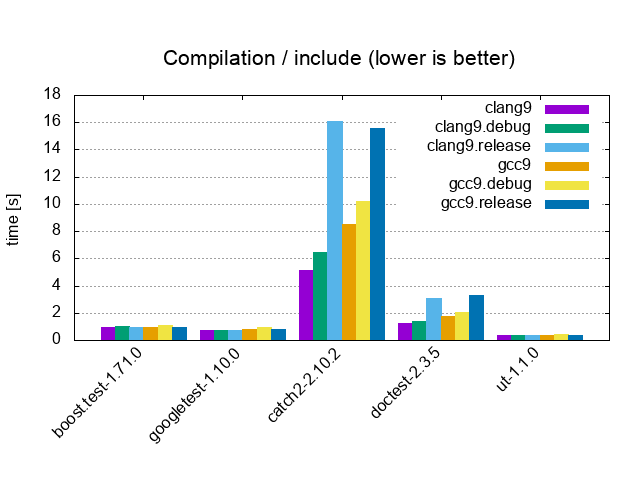
Assert / 1 test, 1'000'000 asserts, 1 cpp file
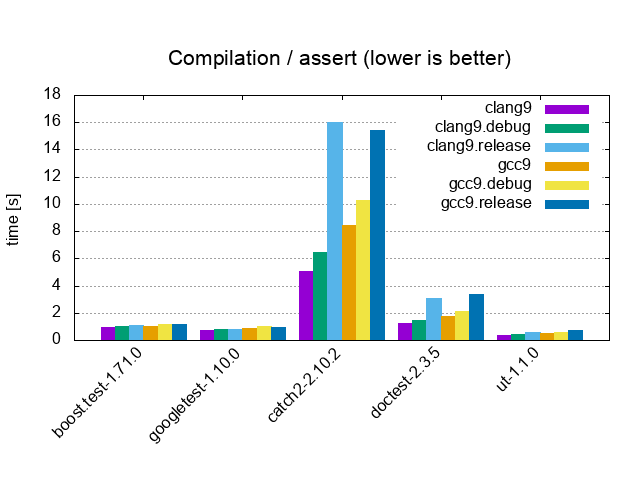
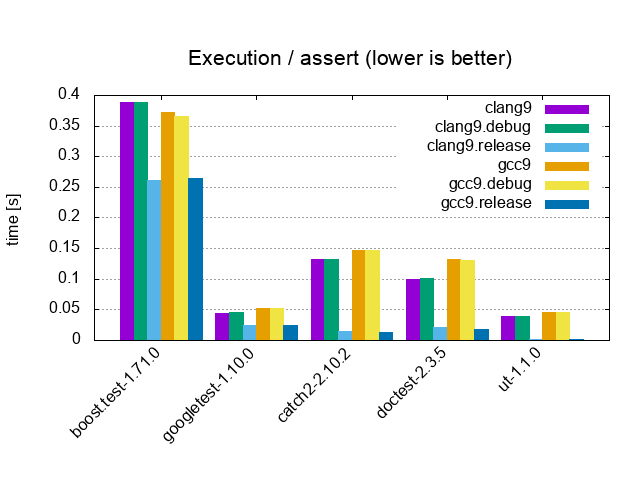
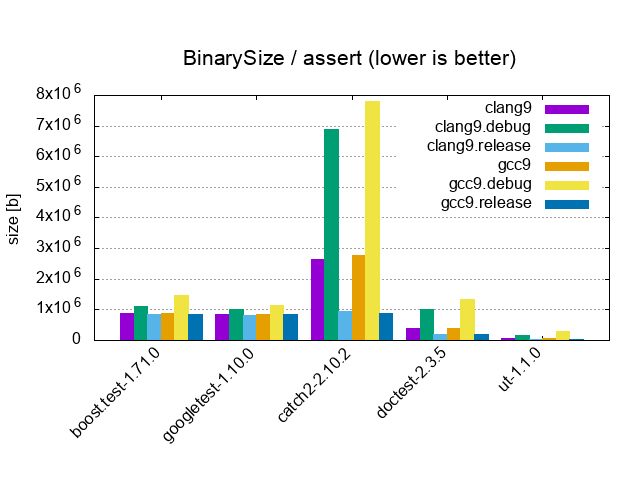
Test / 1'000 tests, 0 asserts, 1 cpp file
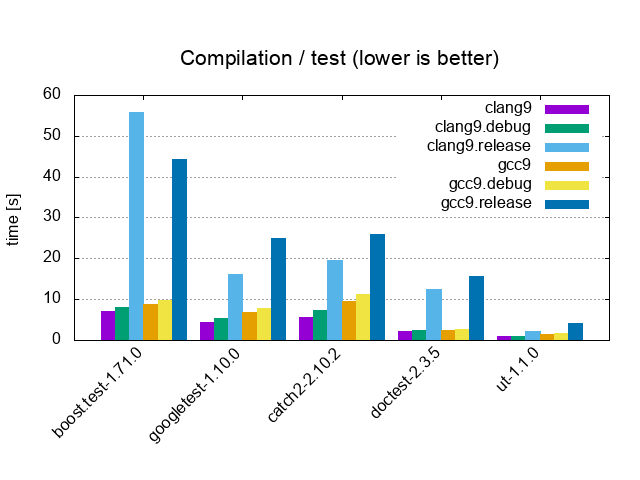

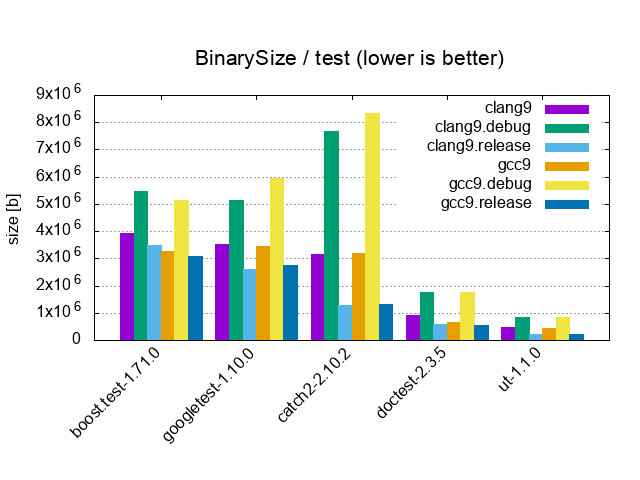
Suite / 10'000 tests, 0 asserts, 100 cpp files
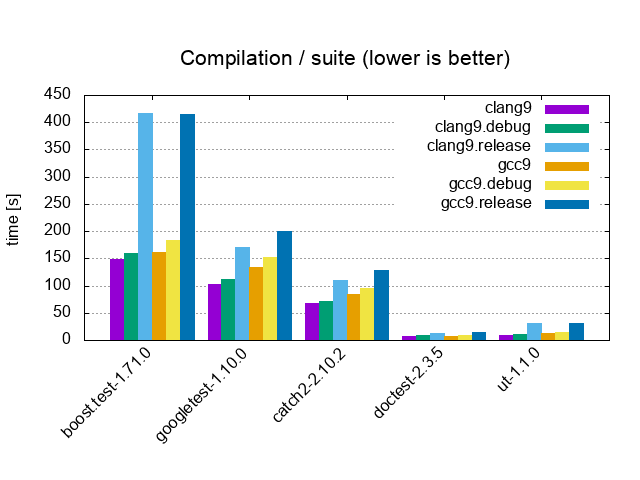
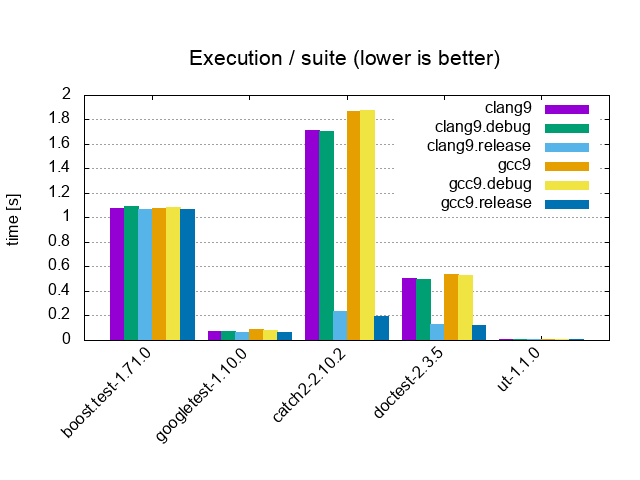
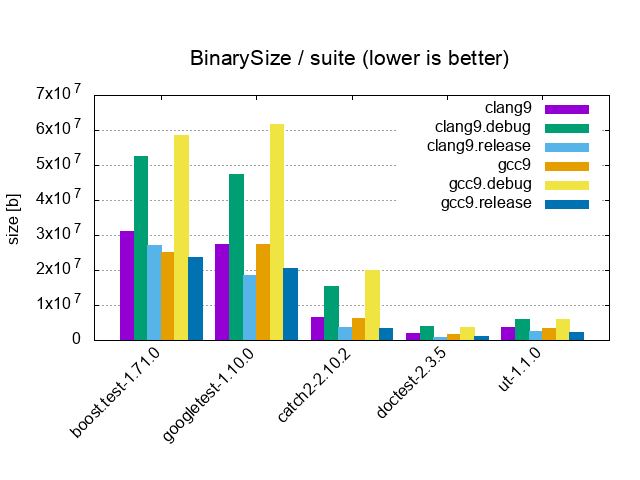
Suite+Assert / 10'000 tests, 40'000 asserts, 100 cpp files
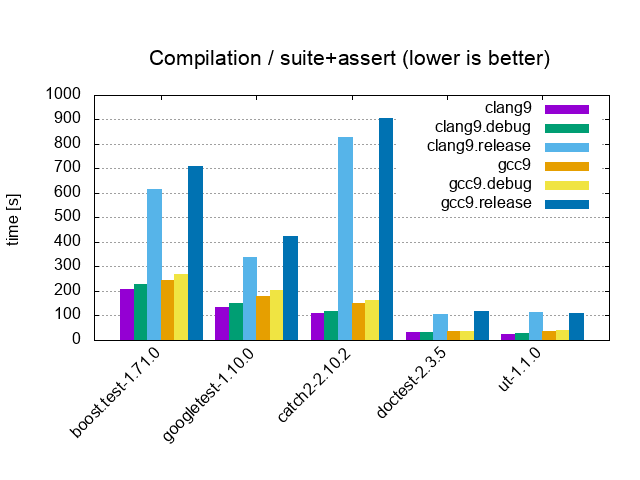
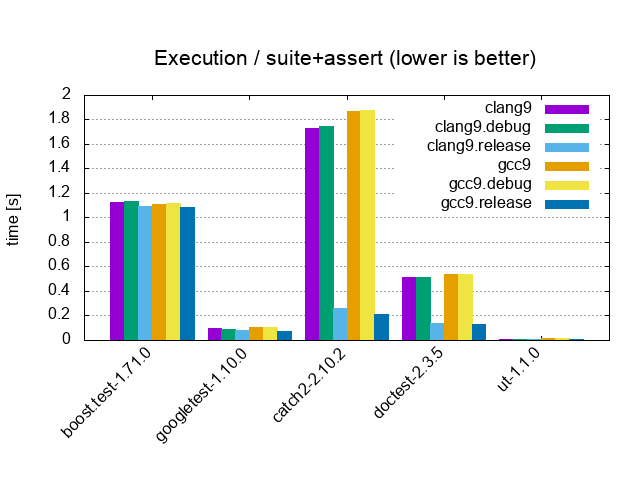
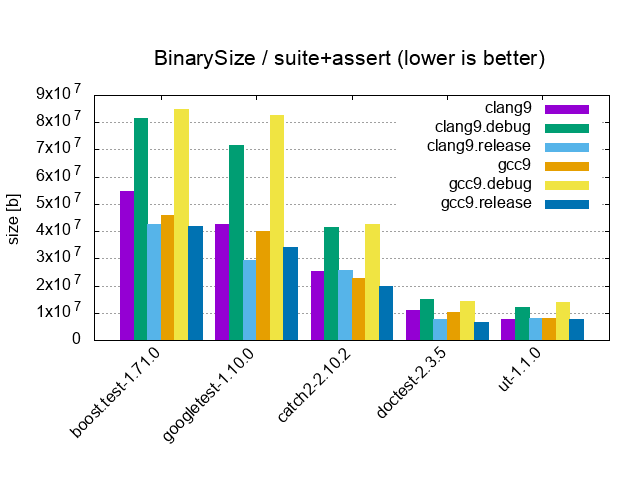
Suite+Assert+STL / 10'000 tests, 20'000 asserts, 100 cpp files
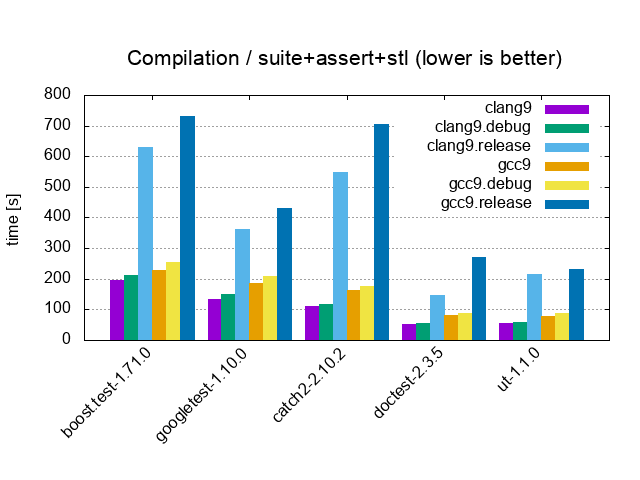
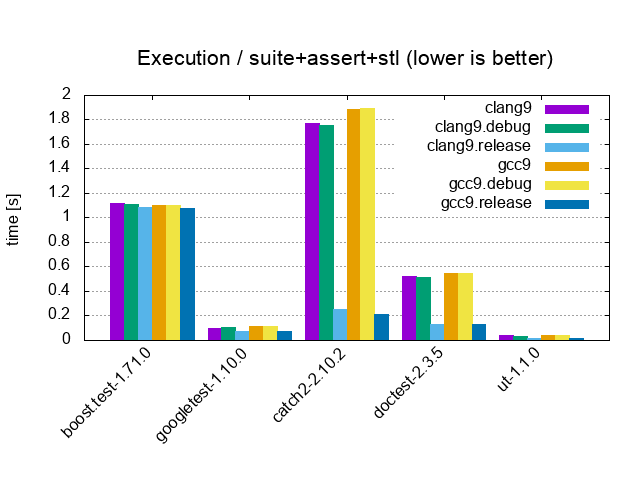
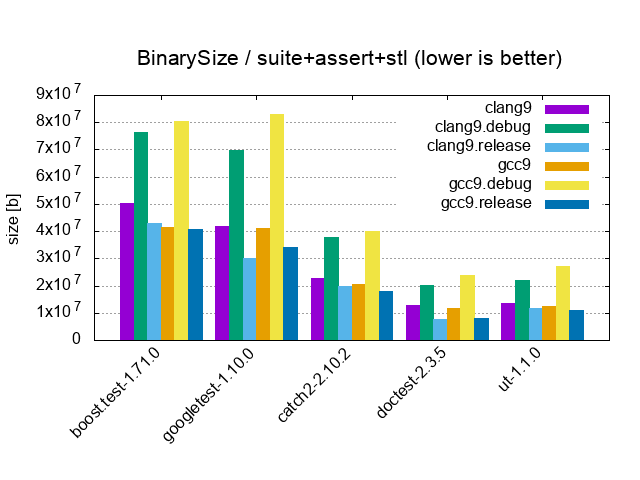
Incremental Build - Suite+Assert+STL / 1 cpp file change (1'000 tests, 20'000 asserts, 100 cpp files)
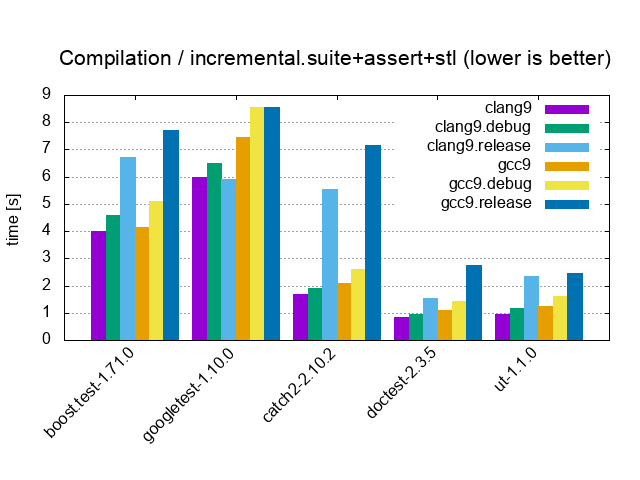
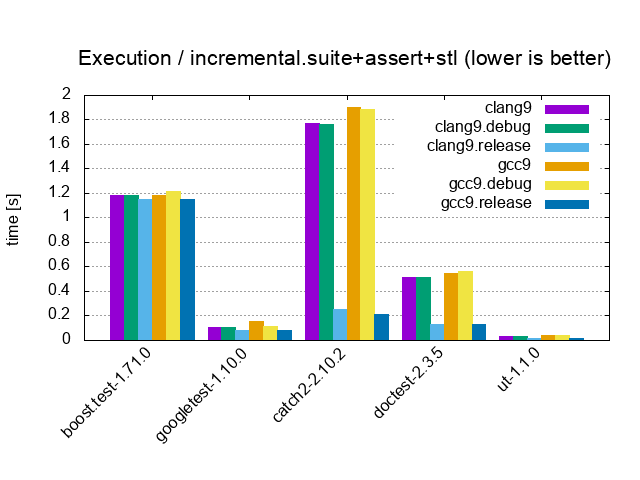
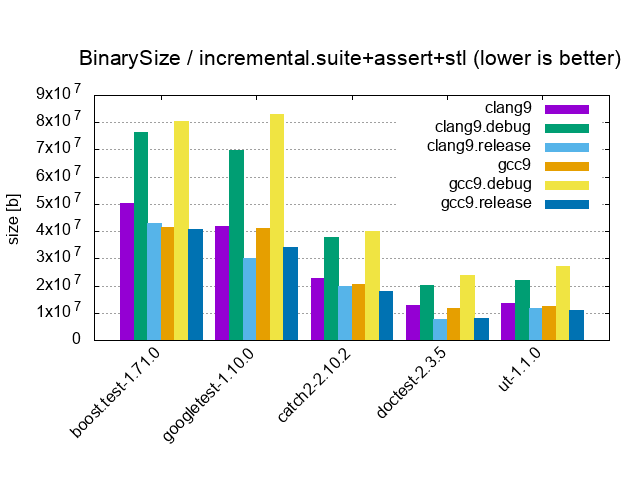
Suite+Assert+STL / 10'000 tests, 20'000 asserts, 100 cpp files
(Headers vs Precompiled headers vs C++20 Modules)
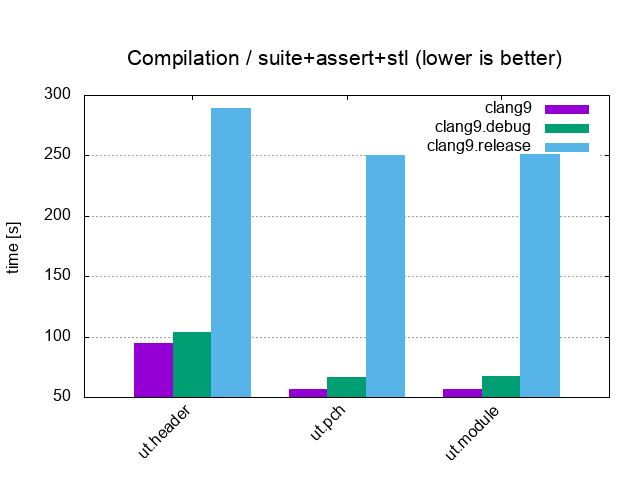
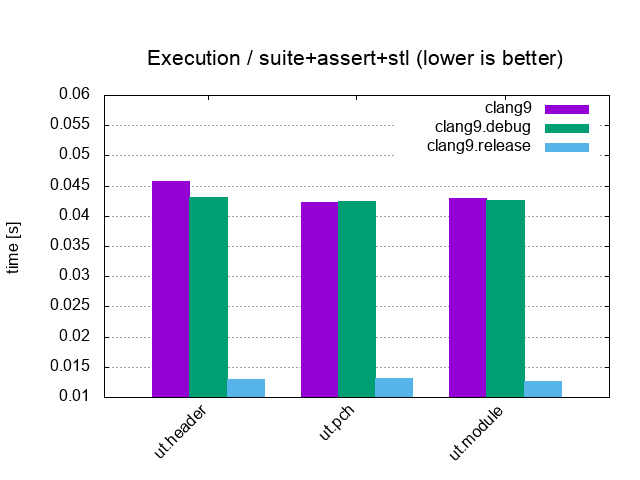

> https://github.com/cpp-testing/ut-benchmark
---
**Disclaimer** `UT` is not an official Boost library.